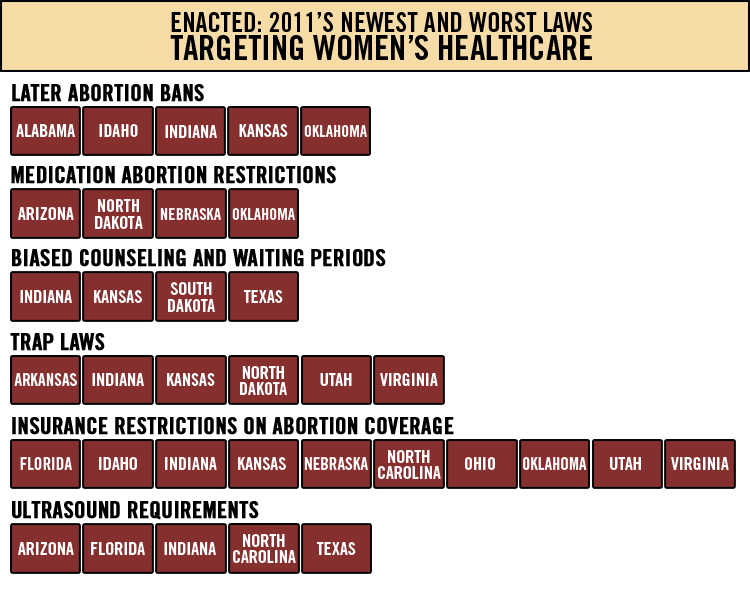2011 at the Midpoint: The State of Reproductive Rights
What’s the worst thing about bad ideas? They’re catching. Once one state passes a new anti-choice law—no matter how outrageously invasive or unconstitutional—it’s on its way to being copied by anti-choice activists and legislators in other states, bound by the same goal: blocking women’s access to safe abortion and other reproductive health services. The Center for Reproductive Rights tracks state legislative activity and analyzes trends across the United States, and our new report, “2011 at the Midpoint,” paints a disturbing picture of the landscape. State lawmakers passed more than 50 measures in the first half of 2011 restricting abortion and undermining preventive care and family planning. And while attacks on abortion in the states have been happening for years, the fallout from this legislative session will be particularly harsh for women seeking reproductive health services in the United States. The Center is now carrying the largest active caseload in its history. In the past six months we have filed lawsuits in three different states targeting some of the most heinous laws enacted this session—and these are just some of the worst among similar anti-choice legislation coast to coast. Take, for instance, our case in Kansas. Dr. Herbert Hodes and his daughter Dr. Traci Nauser run an OB/GYN clinic in Overland Park, Kansas. Their practice provides their patients with a full range of services—including gynecological services and prenatal care as well as abortion—even though increased regulation of abortion and constant protests and threats make integrating abortion into full-service practices an increasingly difficult challenge. On June 17, the Kansas Department of Health delivered just such a challenge—extreme new licensing regulations that target abortion clinics specifically, requiring them to make absurd and medically unnecessary renovations to their facilities and giving them less than two weeks to either comply or shut their doors. The Center immediately filed a lawsuit and scored an initial victory: a preliminary injunction enabling the clinic to continue caring for its patients while the case against the state moves forward. Just two weeks before we launched our legal campaign in Kansas, we filed suit in Texas against its intrusive and patronizing mandate that women seeking abortions must first view their ultrasound, have it described to them in detail, and hear a fetal heartbeat—even if they say “no.” Laws requiring ultrasounds, at times paired with state-authored, ideological counseling, were passed in several other states. Meanwhile, legislators in North Dakota passed in 2011 another law taking a back-door approach to blocking women’s access to abortion. Flying in the face of the World Health Organization, the American College of Obstetricians and Gynecologists, and other medical and professional organizations worldwide, the North Dakota law introduces unnecessary restrictions on the safe and common use of FDA-approved drugs to induce first-trimester abortions that would, in effect, ban medication abortions in the state entirely. The Center has taken legal action to block enforcement of the law—and a North Dakota judge has issued a temporary restraining order pending a hearing scheduled for the end of August. The Center has been closely tracking these and other growing trends in anti-choice activity for two decades and has brought a number of lawsuits to combat efforts to restrict a woman’s right to choose. As we begin to assess the impact of the 2011 session on access to reproductive healthcare, the Center offers this preliminary recap of the major trends and the most onerous laws enacted this session.
Download the Report >,

Download the Report >,
